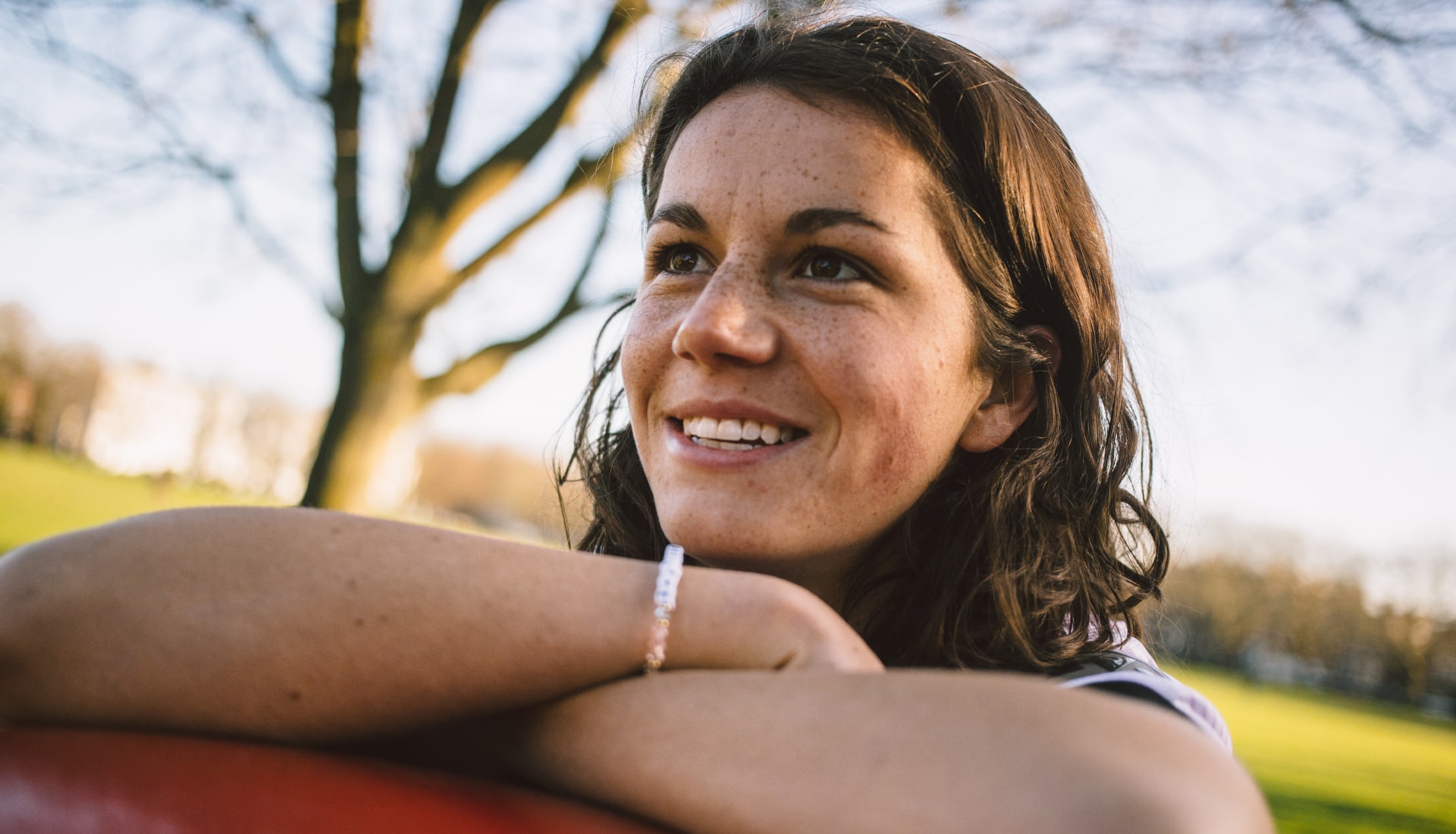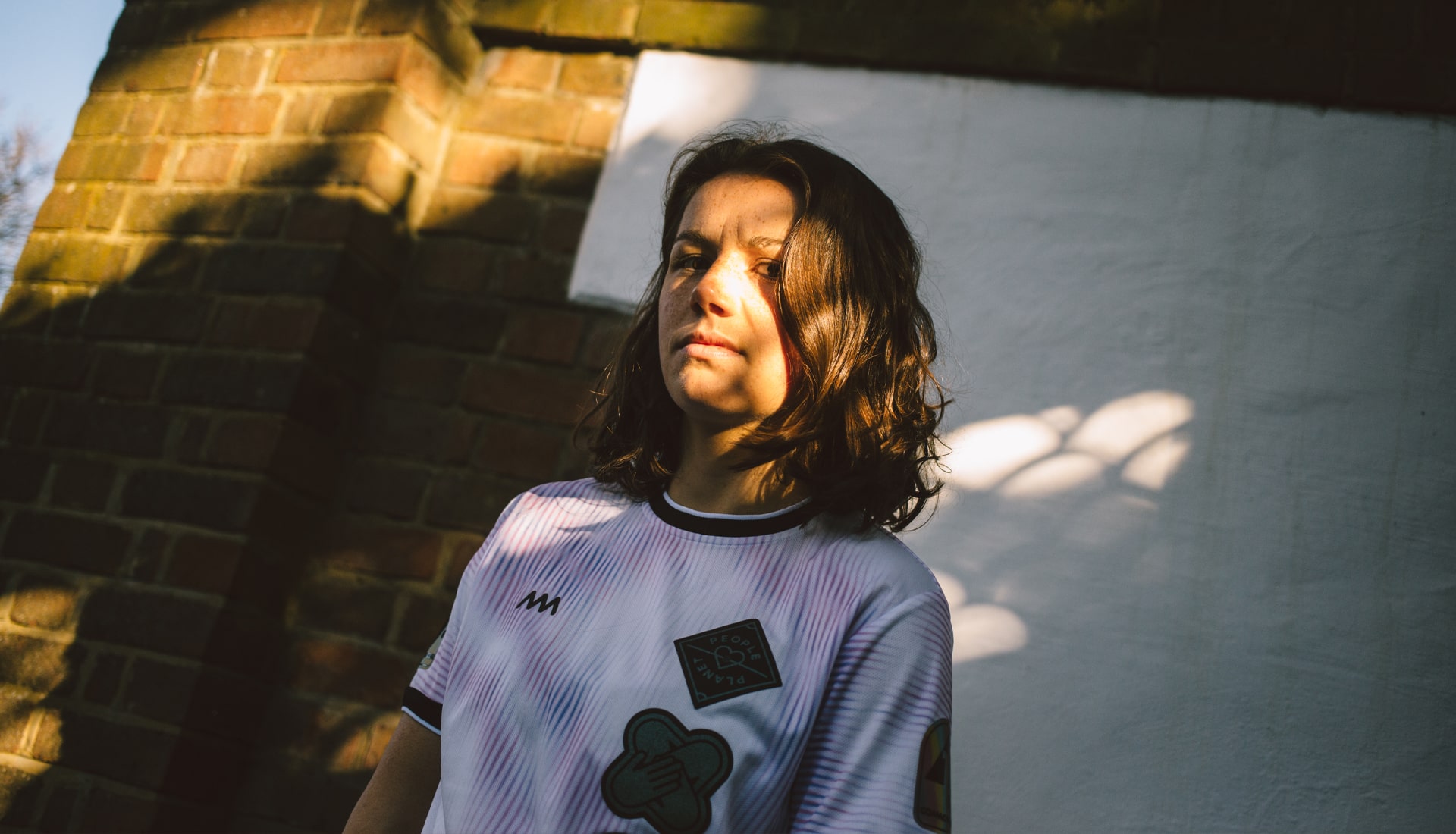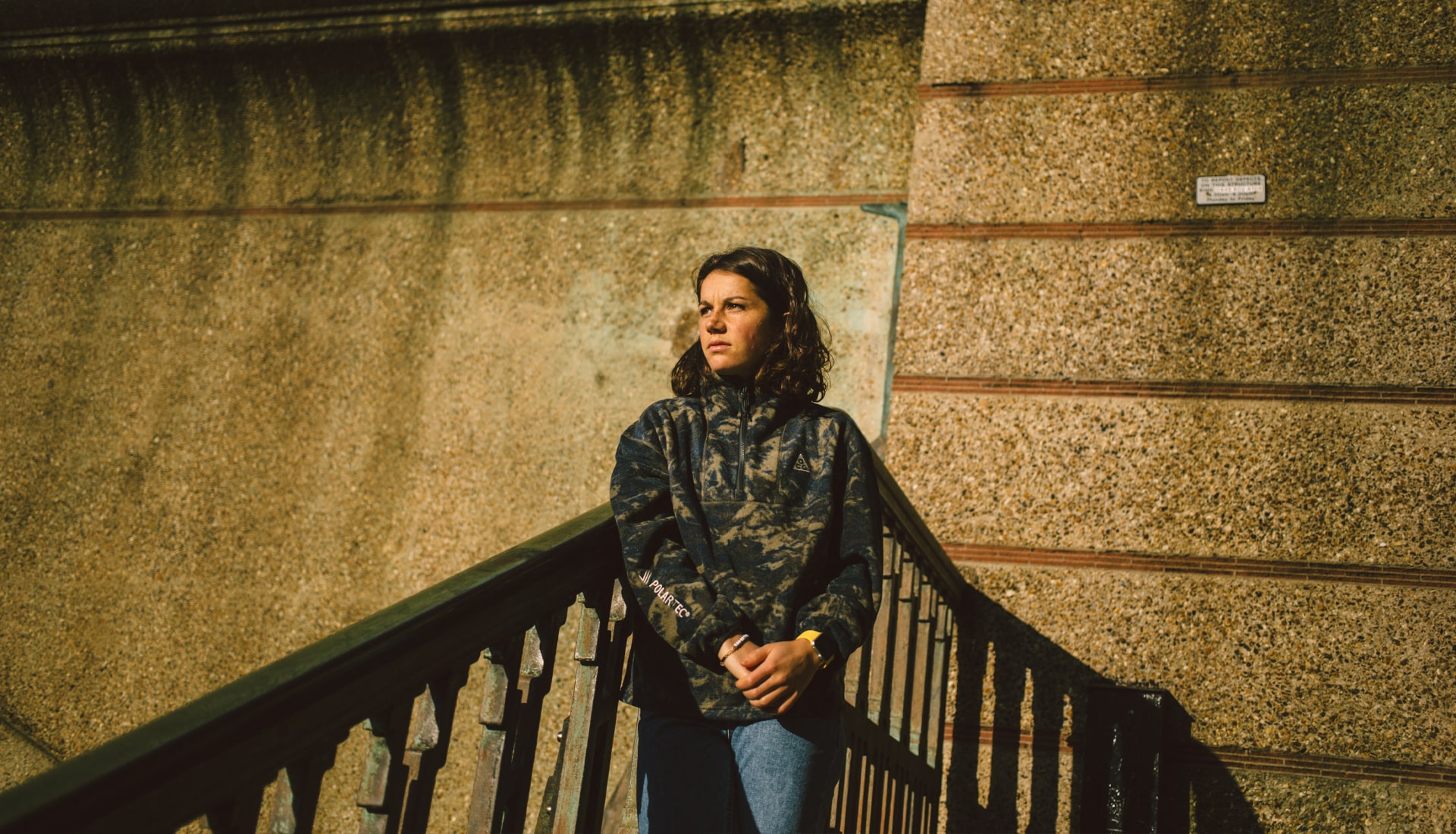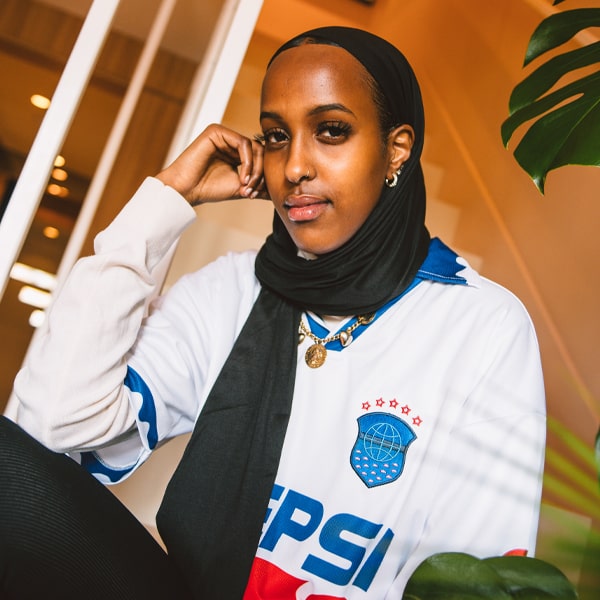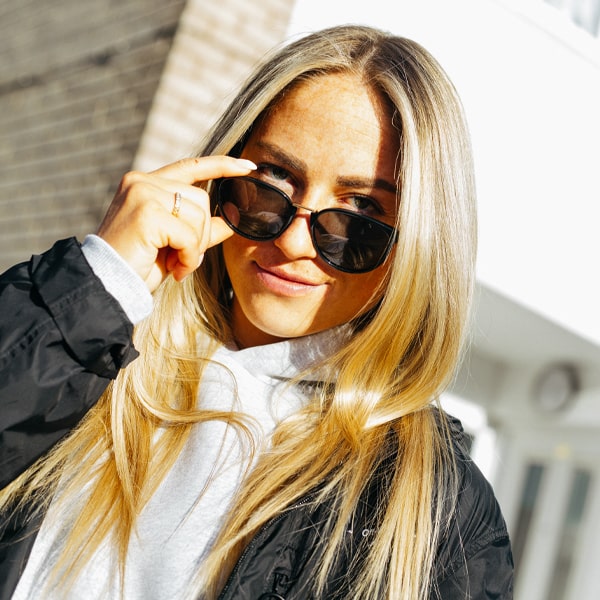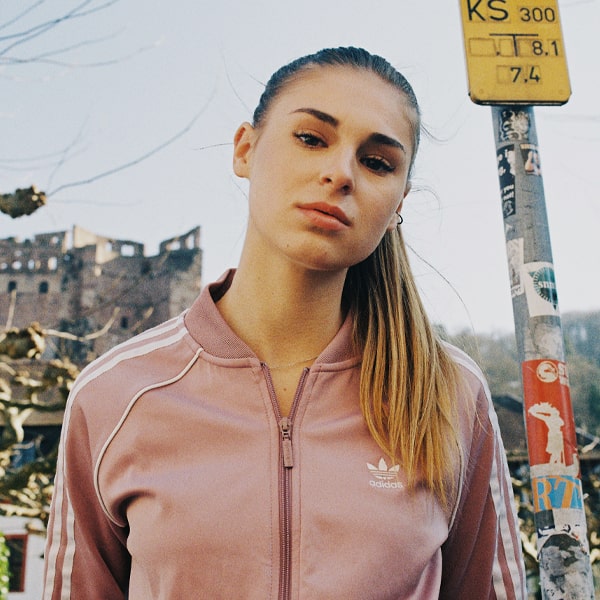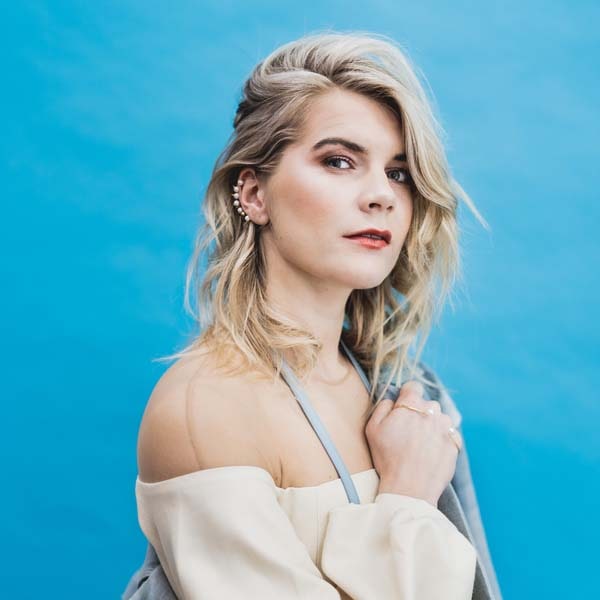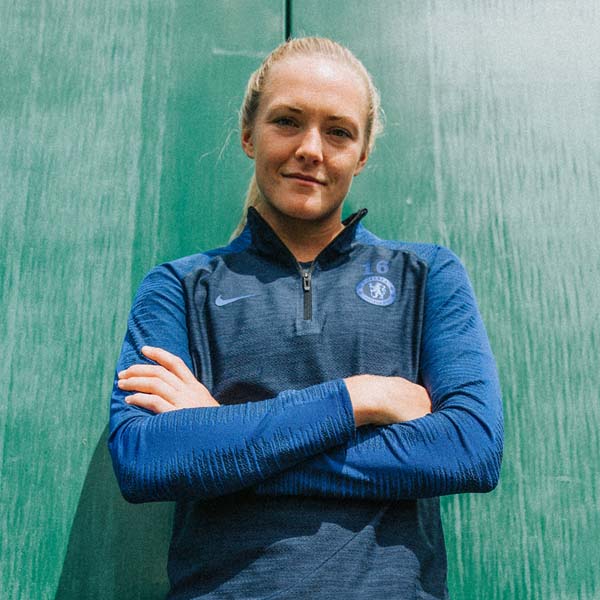Jessie Fleming is way beyond her years, both in terms of her achievements and her maturity. An absolute pleasure to listen to, we gained massive insight into what makes the young Canadian tick when we were fortunate enough to spend time in her company recently.
Not many players get to turn up to preseason training with an Olympic gold medal round their necks, but Chelsea’s Jessie Fleming did. Fact is that, at the age of 23, this is already her second Olympic medal, having picked up a bronze with Canada back in 2016. They’re part of a trophy cabinet that most pros would already be envious of come retirement, and yet she is a long, long way from being done.
With one eye on continual improvement, both as a player and as a person, she speaks with a maturity that is beyond her years. But it’s a maturity that has solid foundations, built upon a strong intellect that appears to never be satiated, and wealth of experience already; she became the second-youngest player to ever play for Canada when she made her senior debut at the age of just 15 and signed her first professional contract with Chelsea straight out of University.
Having established herself as one of the best box-to-box midfielders in the game today, she’s also looking at her influence outside of the game, with her association with Common Goal being just one of the many ways she’s looking to leave a lasting impression. Tenacious in every sense, it was refreshing to explore the many layers of Jessie Fleming with the woman herself.
OK, starting off have you ever been on your own Wikipedia page and looked through how much stuff is on there?
Um, I know my friends give me a hard time about it sometimes, but I personally have not sifted through it, no.
There’s a lot of stuff. You’ve achieved a monumental amount of things. Have you ever had a chance to think about it all?
Yeah, again, friend and family give me a hard time about how I don’t do that often enough. But I think it can be challenging at times because football moves quickly and I have a lot of aspirations in the game, so I’m always looking for that next challenge, that next way to stretch myself.
With what you’ve studied at university as well, it’s not a typical footballer’s background. Would you say you’re not a typical footballer?
No, maybe not. I grew up in a house where my parents were always reading to us and encouraging us to learn and ask questions about the world. My older brother went off to university and did engineering and I looked up to him a lot when I was little. It was that typical older brother/younger sister relationship; I wanted to do what he was doing. And yeah, I like the learning environment, both in school and in football. I love watching other players and learning how that might crossover into my game. Same thing with school. I just like being in a learning environment with people who are curious and want to improve.
So yeah, I like that side of things. I still like to read quite a bit now and maybe I’ll go back to school in a bit. But it’s good just to focus on football and learn with that right now.
So if you had to describe yourself with that in mind, would you say you’re quite an inquisitive person?
Yeah, for sure. I’m quite introverted I would say. And with that comes a lot of introspection and inquisitiveness. I’ve always really enjoyed the piece of the game of taking players that are better than me, or watching mens players and seeing how I can incorporate some of that into my game.
I like the learning environment, both in school and in football. I love watching other players and learning how that might crossover into my game. Same thing with school. I just like being in a learning environment with people who are curious and want to improve.”
Researching someone prior to an interview is always and interesting process. Looking at your instagram page there’s a lot of consideration with putting everything in landscape and there’s some film shots on there as well… With that, have you picked up a camera much?
Yeah, I’ve always liked photography. I meant to ask you about your cameras actually… My parents got me a film camera about two or three years ago now. I’ve always enjoyed it. I had an aunt who was really into photography, and it was just a nice way that we could spend time together at Christmas and stuff. So yeah, I’ve always been a bit interested in that.
There’s one shot of you recently, cooking in a kitchen…
Yeah, with my little sister. Yeah, we’re making pizza at home.
It’s beautiful in terms of capturing that moment. It’s very personal and quite intimate. Are you quite sentimental in that respect as well?
Yeah I’d say so. Whenever we go on family vacations or we spend time together at Christmas I’m always trying to get those pictures. Then in the past I’ve given my parents photo books. I just think it’s a nice way to preserve memories.
Have you ever thought about taking your camera on the road with you while you’re playing?
Yeah to be fair I’ve thought about it. One of my teammates fro Canada, Sophie Schmidt, has actually done it a couple of times with Houston. She’s taken a disposable camera. I think it’d be cool, that’s a neat idea.
You definitely should. Would be a great way to show a personal side behind the scenes…
It would be cool. I find it hard sometimes though, because some people don’t want to be photographed, so it’s just picking the right moments. Capturing those moments when people least expect it is the nice bit.
It’s been a learning curve to be honest, trying to get the aperture and exposure right. It’s been challenging. But I like that you take a picture, and then you don’t see it for – well for me three or four months, because I get it processed and I’m never in a rush. So it’s kind of cool, because you go back and you look through and you’ve almost forgotten what you’ve taken pictures of. Then some turn out kind of quirky or not quite what you expected. I really like it.
Film photography is a good metaphor for life, in that the imperfections are actually the perfections…
Yeah. It’s almost been hard for me because I’m a bit of a perfectionist with things. So it’s good for me because you have to slow down, pick your shot and you can’t take a bunch of shots to get “the right one”.
So where does the inspiration behind things like your Instagram image layout come from? It shows a creative mind and that you’re thinking about things in a slightly different way…
I dunno. I think maybe I’d go back to the influence of maybe my Mum and my brother. My mum was always – we have a room dedicated to craft at my house – and she was always doing painting with us, macrame, we made all of our own Christmas decorations, we made gingerbread houses at home, so I think there was always that artistic side at home. My Grandma would knit us sweaters and socks for Christmas. So maybe some of those homesteading practices that I didn’t think were cool when I was younger I’m starting to enjoy them and get more invested in them now.
My brother’s really artistic as well. He wanted to be an architect for the longest time, so he was always drawing and doing stuff like that and again, I thought everything he did was cool.
For me I’m not super-into Social Media, so I’m trying to find my feet and see what works for me and what I like. So maybe that explains the infrequency of my posts, but I try and reflect myself in a more genuine way.
It’s hard because sometimes I think with social media people put out what they want people to see. I’m trying to get more comfortable with putting out what is actually there and not always just the super-positive stuff or how people maybe envision what I’m like. I think it’s hard to convey that through social media, so I’m trying to find the best way to do it. But again, I don’t love it… I don’t love the habit of always needing to check it.
Going to college in LA and experiencing life while playing sport at a high level… what was that like?
I loved university. I made some really good friends – people who are going to be in my wedding party hopefully sort of thing. But for sure I always teetered on the decision of did I make the wrong decision of not going pro earlier and maybe accelerating my development on the pitch. But looking back and seeing what I got out of it on a personal level…
Yeah, I got a lot out of it and made some really close friends and kinda had to deal with figuring out how to balance different aspects of my life, realising that you can never really balance it. So like being able to cope with the imbalance and the pendulum swaying between soccer and school and family and friends. And just learning about myself and learning what I need to cope with challenges: getting a bad result on a test, or having a bad game, or when you’re tired.
Learning about yourself away from sport is so important…
Yeah, for sure, what my interests are, what my likes and dislikes are and how I cope as a human in those situations and maybe what I need. I learned and absolute tonne about myself and built some really strong relationships.. I’m still in touch with a bunch of my friends from school and hopefully we’ll be able to get together with them every year or two. I miss them, but it’s a very different, unique time at university. You spend everyday with the same people for years, which is not normal. I realise that now. Hindsight is such a powerful thing, but when you’re in it you don’t realise how unique it is.
I think you have these preconceived ideas of what a Sam Kerr or what a Pernille Harder is like. I looked up to P a lot when I was younger, just playing against her for Canada, so it’s so cool to meet this person, and we’ve actually become quite good friends and we have a really good partnership on and off the field. You just level with people.”
At that stage of your life or even before, growing up in Canada, did it feel like being a professional athlete was a realistic dream?
I don’t know how much I was thinking about it. I think I was really lucky in that when I was younger I was just worried about being a kid. I played boy’s hockey a lot, so there was a dream about being in the NHL for a while. I was just around sports and playing them because I enjoyed them and my friends were tied to sports. I don’t think it became more serious until I got a bit older and I got onto the national team and kind of had more exposure to people who were playing in pro teams. That’s when it probably materialised a bit more.
What about the thoughts of travelling to the other side of the world and playing in England… were things like that ever on your radar?
I can’t remember how old I was… I think I was 12 or 13 and I was playing for the provincial team in Ontario and we were really lucky because we got to go to Spain, and we played games against Barcelona’s academy, we got to go and watch Messi and Iniesta play at Camp Nou. So I think that experience, plus my dad always loved Barcelona and we watched a lot together and it kind of exposed me to European football. Seeing the academy play, that was really unique, and getting to go to their training ground and see all of that, I think it opened my eyes a bit more to what was out there in Europe.
Then obviously I had team mates come over here and speak really highly of their experiences. I think it’s good going to a different culture and experiencing a different style of play, different style of coaching. Compared to North America people live and breath football here. It’s very different. It’s not the same in North America. That’s what I really like, the passion with the fans and the community.
Why do you think there’s such a strong contingent of Canadian players out here in the WSL?
I think the league’s doing really well right now. There’s lots of investment in the women’s game here. Obviously England’s an English speaking country. But again, I think it’s just the culture of football here and the depth of the league makes it the perfect place for players to get opportunities at different clubs.
Have you felt the profile of the game change even in the time you’ve been here? Developing, growing…
For sure. You see more and more players coming from countries like Sweden or Germany, Canada, the U.S. coming here and wanting to experience the league and play in the league. You also see TV contracts growing and women’s games on TV on big nights. I just think little things like that will continue to add to the quality of the league here.
In terms of lifestyle, going from University to a whole different country and the professional setup… it’s a mad transition I’d imagine?
It definitely is. Last year I was still finishing up my degree up until June, so this year it’s kind of been nice to just have more down time and more quiet time and just focus on football and focus on what my body needs. But yeah, for sure it’s a big transition. The girls on the team have been so good helping me with that.
What’s it taught you about yourself in terms of fending for yourself that little bit more?
I think last year was also challenging because of the situation with COVID, not being able to see friends and family as much as I would in a normal year, but I think it was a good thing in terms of a silver lining – it gave me more time to learn about myself. I’ve got really into stoicism in the last year or two, so digging into that a little bit.
Can you tell me about the process and how you got into that?
So I worked with this sports psychologist through the national programme since I was about 15 or 16 and I’ve actually became quite close with him. He’s since left the national team after the Olympics but I still talk to him every other week. It’s turned more into just conversations and firing ideas. But he’s always giving me recommendations on podcasts. So I’ve just got a little bit inspired by that and just hearing other athletes and high performers talk about the value of stoicism and introspection, and then got into Brian Holliday’s books over quarantine. Just spending more time reading.
I think it’s really applicable to football too. Just about keeping your emotions in more of an even keel, not having such a wide spectrum of emotions where the highest highs are so high as you’ll obviously have games where you’re not playing well or practices where things aren’t going well, or getting injured and not letting that affect you in such a negative way that it’s controlling your life. It’s learning about what football has to bring – nobody’s going to have a perfect career or trajectory.
Podcasts really let you in on those types of conversations. With your rising profile, have you ever thought about doing them yourself?
I have not. I still feel like I’m trying to figure out my way of communicating what I’m about, and I think that I could be better at that. But I still don’t know what that looks like, so I think I’d lean more towards photos than podcasts. But Janine was doing one for a while, and I had a conversation with her on her podcast.
I chose to put my proceeds towards getting more women involved in leadership roles in football, which I think is important, especially as a woman in football myself. Just having coaches or people working on technical staff, even physios… just having women in that environment alongside men is important."
It’s so refreshing to hear that perspective. So often in football players just end up being names on a team sheet, and we forget that there’s a human character behind everything that goes into it…
For sure, especially when you come to a new club. I think you have these preconceived ideas of what a Sam Kerr or what a Pernille Harder is like. I looked up to P a lot when I was younger, just playing against her for Canada, so it’s so cool to meet this person, and we’ve actually become quite good friends and we have a really good partnership on and off the field.
You just level with people. You don’t step into a room and they act like they’re above you…they’re just teammates and friends and you go and get a coffee with them and talk about what book your reading or how their Christmas vacation was. Even like the men’s players, you might get a bit awe-struck, but then you start speaking with them and they’re just a normal person.
You have two Olympic medals to your name, one of which is gold. It was a monumental summer, so how precious was it and how do you use it to look forward?
It was a very special group of players in how connected we are. It just goes to show that, I don’t think on paper we had the best team in the tournament, but that’s what’s so special about our group is that you could have one plus one plus one… you have eleven players. But with Canada there’s a multiplying effect, where when we’re together we have this ability to bring out the best in each other, and we really truly believe in each other.
So when you see someone like Steph Labbé perform in the way she has for us in recent years – when I first got on the team she wasn’t playing at all, probably wasn’t in a good place, wasn’t really enjoying her football, now here she is saving an insane number of penalties in these big moments. Players like Ashley Lawrence who’ve taken off… a lot of it’s on behalf of the platform that our veterans have created for us. I’d like to transfer that to places like Chelsea and bring that special cultural aspect that I think can be really powerful.
So you want to leave football in a better place for the people that follow?
For sure, but I think that’s just what I saw from the moment I was on the national team. People like Erin McLeod, Diana Matheson, Desiree Scott and that was all I knew, so that washer I thought everyone acted. I wanted to be just like Erin. I thought she was so cool. Just the way they behave, they have no problem putting a younger player, not on a pedestal, but build them up, even if it means that they’re going to get less minutes. It’s that commitment to the greater goal, the team. It shines through on that team. It’s a really special environment. Even when I think back to the summer, some of my favourite memories were like, we did a Mario Kart tournament with the team, and just how invested we got in that. We were able to ride bikes around the Olympic village. It’s just a really special bond.
Joining Common Goal – can you tell us about the link up with them?
Again, I think I was inspired by some of my teammates on the national team There was quite a few people who donate to Common Goal each year, like Erin McLeod, Janine Beckie… I think there’s 10 or 11 of us on the team now. And for Chelsea too. For me it was just the standard that had been set, so it was a no brainer. I mean, it’s one percent… I think going back to doing my part, even if it’s small, to leave the game in a better place. Especially with the women’s game. I chose to put my proceeds towards getting more women involved in leadership roles in football, which I think is important, especially as a woman in football myself. Just having coaches or people working on technical staff, even physios… just having women in that environment alongside men is important.
With your move to Chelsea your status grows… have you seen that as an opportunity to be able to make a change both inside and outside of football?
Yeah, for sure. I mean, it still feels like I’m not doing enough. I’m excited and curious to learn more about what more I could be doing with Chelsea and Canada and we’ll hopefully find more avenues to give back to the game that has obviously given me all of my best friends and all of these opportunities over the years.
Do you feel like a role model yet?
Someone asked me a similar question this summer actually. Not really. I think it’s really hard to see yourself in that light. When I look at myself I still see all the things that I, not want to change, but that I want to improve on. I just see growth areas. I still find it really challenging to see myself in that light. But I would like to think that some of these things, like Common Goal, and other things that I’ve been involved in are hopefully are setting positive standard for players to come.
So in terms of growth areas, what things outside of football would you like to experience more, things that you might not have time as a player?
I definitely think I want to go back to school at some point. I really like the learning environment. I’d really like to do a masters degree in environmental science. I’m really interested in sustainability and green cities: sustainable architecture, sustainable materials. One cool thing about London is the museums. I’ve been able to get quite invested in that and go to a couple of cool ones, like the design museum. I think it’d be nice to bring that side more to Chelsea. Be able to take classes and work towards a masters degree. It’s also been nice since finishing my under grad to take some downtime and just do football for the past six months. Because really, my whole life I’ve been in school. So it’s definitely a change up.
University environments are so special because to get further along, to masters and PHDs, people are so passionate and such dorks in their little niche fields, and it’s the same thing with football. When I think of our assistant coach at Chelsea, she’s really just a dork about football. I think when people are able to bring that passion and they’re able to enjoy what they do it carries over onto other people. So I think that’s why I like the university environment so much. You’ll get a professor who could talk all day about plants or grass or urban farming, and they just get so into it. I think being around people like that I really like.
Being in London then, when you move around, do you take in all the architecture and all the stories behind it all?
Yeah, one of my favourite podcasts is called 99 Percent Invisible, and it’s all about hidden architectural quirks in cities that people maybe overlook. It’s a really neat podcast.
London is huge. It feels like I can’t even begin to explore all of it. But yeah, when my parents come to visit I love going to new neighbourhoods. I really like Hackney wick and Dalston Junction, that area is cool. Then my brother’s super-into the parks downtown. He likes going there and walking around.
Finally then, 2022. How would you describe what you want it to be?
That’s such a hard question! It’s nice to be able to take more time and not feel stressed like I should be doing something else. Even little things, like I’ve been trying to get into yoga with my parents. I call them once a week and we do yoga together. It’s quite funny, because my dad’s not flexible at all. His hamstrings are horrible. But he says it’s helping him so. We play cards as a family online sometimes, so just having more time to do that and not feel like I need to be somewhere else. 2022… I dunno. I think with school not being there I’m just excited to put in the work everyday and keep trying to build my game and keep trying to be a creative force at Chelsea and with Canada. And then I think just continuing to grow off the pitch. This conversation has definitely made me want to get back into photography!
Jessie Fleming wears the Nike Tiempo Legend 9, which you can pick up at prodirectsoccer.com
